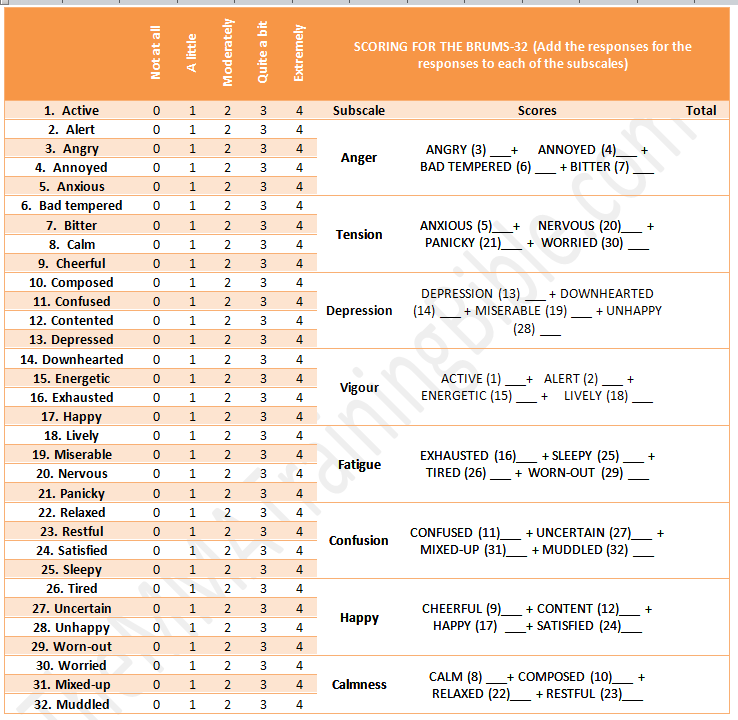Before you get started on this article, be sure to read Part 1 in this series, which focuses on the fundamentals of performance testing.
The MMA Training Bible recommends that fighters regularly monitor their mood, as it can be a sensitive measure of overtraining. For example, feeling apathetic (having no interest, no feeling or no concern) or having a depressed mood, decreased self-esteem, feeling emotionally unstable, restless, or irritable are all associated with overtraining. The Brunel mood scale questionnaire (BRUMS) is a psychological tool that can help you measure your mood, and help to identify your potential for overtraining.
The Brunel mood scale questionnaire (BRUMS) serves to describe current mood states using 24 mood descriptors, such as angry, confusion, depression, fatigue, tension, happiness and vigor. You assign a score to each descriptor using a 5-point scale (0 = not at all, 1 = a little, 2 = moderately, 3 = quite a bit, 4 = extremely). The questionnaire takes a few minutes to complete and can be used to monitor overtraining. Here’s what it looks like:

You can download and print off your version of the BRUMS here. Remember, the BRUMS is a list of words that describe feelings people have. Please read each one carefully and then circle the answer that best describes HOW YOU FEEL RIGHT NOW. Make sure you respond to every word. After you’re done, add the responses to each of the 32 questions according to the subscales on the right-hand side of the page and arrive at a final score for each subscale. The total score for each subscale is what you’re after. As the months go by, you can monitor how your mood changes and this can give you some indication as to whether you are overtraining.
There are a number of other psychological tools that The MMA Training Bible uses to help fighters and coaches monitor their performance. Performance profiles, for example, can help you reflect on and become more aware of the performance qualities necessary for successful MMA performance; they can also help you identify your strengths and weaknesses in the areas of technical development, physical conditioning and psychological skills. Let’s go through an example of how these profiles work. Below you’ll find a profile for technical development.

To use the profile, simply rate your current perception of your ability in each quality using a scale of 1 (lowest possible ability) to 10 (Professional ability) by shading in the pie sections to the appropriate level. It is advisable that both the coach and the fighter complete their OWN profile, then compare the results as a team, and identify the most important areas of improvement. These areas of improvement often become your training objectives, and should provide focus to your overall training plan. As a general rule, fighters and coaches should aim to fill out these profiles every month or so, or as needed.
The MMA Training Bible also uses Goal Setting strategies to help fighters and coaches gain a psychological advantage in the cage, but reviewing all tools of these in detail is beyond the scope of this article. Consider enrolling in the MMA Training Bible’s Step-By-Step Guide to Goal Setting if you’re interested (it’s FREE) incorporating all the tools mentioned here. Dr Gillis will teach you how to use performance profiles for Technical development, psychological skills, and conditioning, in addition to a formal goal setting process.
Download the MMA Training Bible’s data collection book here. This will allow you to record your data and chart your progress on this test and all of the other tests described in this article series.
That’s it for this article, be sure to watch out for the next in the series, which focuses on Flexibility.

Leave a Reply